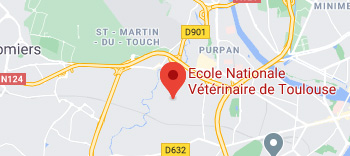Our international strategy
This strategy defines the key issues that ENVT will have to address in the coming years :
- preparing future graduates for professional activity in a globalized world ;
- to increase the visibility and influence of ENVT internationally ;
- to strengthen ENVT’s presence in international research and development networks.
It is part of the strategic international program of the Ministry of Agriculture and Food (MAA).
It is conducted in partnership with members of various networks or institutions at the local, national and international levels : the Université Fédérale de Toulouse (UFT), the Institut Agronomique Vétérinaire et Forestier de France (IAVFF), the other French National Veterinary Schools (ENVF), the Centre de Coopération Internationale en Recherche Agronomique pour le Développement (CIRAD), l’École Nationale des Services Vétérinaires-Vétérinaire International (ENSV-FVI-France) and the World Organization for Animale Health (OIE).
Developing mobility - incoming and outgoing students and staff
Incoming and outgoing mobility of students and staff is achieved through the Erasmus+ program and bilateral exchange programs with 16 institutions in 9 countries, mainly in South America (Brazil, Argentina) and Canada.
Outgoing student mobility, which is already 100% effective, is made possible in the best possible conditions thanks to an ambitious policy of developing academic mobility and internships throughout the world.
The hosting of international students and lecturers is also a priority for ENVT.
The objectives are :
- To improve the qualification of students through the exposure to different educational and professional systems and through immersion in a different culture;
- The acquisition or strengthening of a portfolio of skills for ENVT staff;
- The development of research collaborations.
Developing and perpetuating training and research programs with international partners
ENVT’s objective is to build long-term relationships with its well-known partners, to strengthen international cooperation in research and training in its fields of excellence and to improve its attractiveness and recognition.
In collaboration with the other ENVs, the development of training programs with international partners is based on responses to national and international calls for tender.
Scientific collaborations are developed through the school’s involvement in European and international research programs, notably through its Research Units (UMR). The hosting of foreign PhD students and researchers, the supervision of co-tutored theses, and the organization of scientific conferences and symposia all contribute to the internationalization of research.
Improving the attractiveness of ENVT for foreign students, lecturers and researchers
ENVT is committed to a policy of attracting foreign students, lecturers and researchers by :
- Developing synergies between research partnerships and student or staff mobility to make its international activities more visible. This promotion is done through the mobility of our lecturers, researchers, staff and students and through the completion of cooperation projects regarding veterinary education;
- Encouraging and accompanying the individualized welcome of students, researchers and lecturers on site, notably in line with the new criteria of the European educational area and within the guidelines of the good practices of mobility management of the Université Fédérale de Toulouse of which the ENVT is a member.
Reinforcing and developing our Erasmus policy
The Erasmus policy has been a key of our European development strategy for many years.
In 2020, ENVT renewed its Erasmus+ Charter for Higher Education, which commits it to principles of quality and transparency in the organization of student and lecturer mobility, the hosting of international students and lecturers, and the internationalization of its training programs.
The Erasmus + 2021-2027 program aims mainly at strengthening our student mobility policy (hosting Erasmus students, increasing ENVT students’ outgoing mobility in Europe) and cooperation between European organizations and institutions.
The actions undertaken contribute to the acquisition of a European culture that is already well established among our students and staff and thus to the development of the European Education Area.



